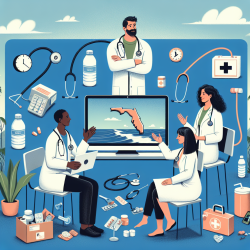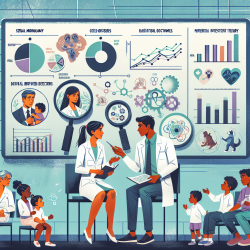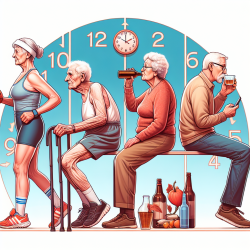Introduction
In the face of natural disasters, the challenges for individuals with chronic diseases are often compounded. The research article titled "Florida Disasters and Chronic Disease Conditions" offers valuable insights into the needs of these individuals during disasters and provides guidance for practitioners to enhance their skills and improve outcomes. As speech-language pathologists, understanding these dynamics can help us better serve our clients, especially in the context of online therapy services like those provided by TinyEYE.
Understanding the Impact
The 2004 hurricane season in Florida highlighted the vulnerabilities of individuals with chronic diseases. With millions displaced and infrastructure severely damaged, the need for specialized care in disaster scenarios became evident. The article emphasizes the importance of designated special-needs shelters equipped with healthcare professionals to address the specific needs of these individuals.
Key Takeaways for Practitioners
- Special-Needs Shelters: Practitioners should advocate for and support the establishment of shelters that cater to individuals with chronic diseases, ensuring they have access to necessary medical care and resources.
- Medication Management: Encourage clients to maintain an up-to-date list of medications and prescriptions, which can be crucial during evacuations and shelter stays.
- Communication Strategies: Utilize multiple communication modes to reach clients, especially those with language barriers or low literacy levels. This ensures they receive vital information during emergencies.
- Post-Disaster Support: Be prepared to offer support in the aftermath of disasters, helping clients navigate the challenges of returning home and accessing necessary services.
Implementing Research Outcomes
For practitioners, the insights from this research can be transformative. By integrating these findings into practice, we can enhance our service delivery, particularly in online therapy settings. Here are some actionable steps:
- Develop Emergency Plans: Work with clients to create personalized emergency plans that include communication strategies, medication management, and evacuation procedures.
- Collaborate with Local Agencies: Build partnerships with local health departments and disaster relief organizations to ensure clients have access to necessary resources during emergencies.
- Educate and Empower Clients: Provide clients with education on disaster preparedness, focusing on the unique needs of those with chronic diseases.
Encouraging Further Research
While the article provides a comprehensive overview of the challenges faced by individuals with chronic diseases during disasters, there is always room for further research. Practitioners are encouraged to explore additional studies and data to continually refine their approaches and improve client outcomes.
Conclusion
The lessons learned from Florida's experience with natural disasters underscore the importance of preparedness and specialized care for individuals with chronic diseases. As practitioners, we have the opportunity to apply these insights to our practice, ensuring that we are equipped to support our clients in times of crisis. By doing so, we can contribute to building a more resilient and responsive healthcare system.
To read the original research paper, please follow this link: Florida Disasters and Chronic Disease Conditions.










